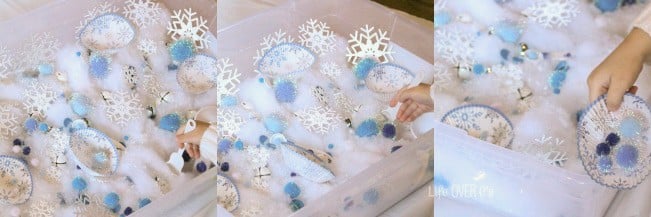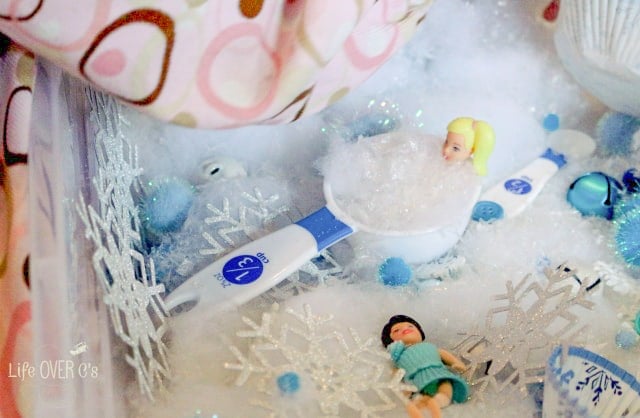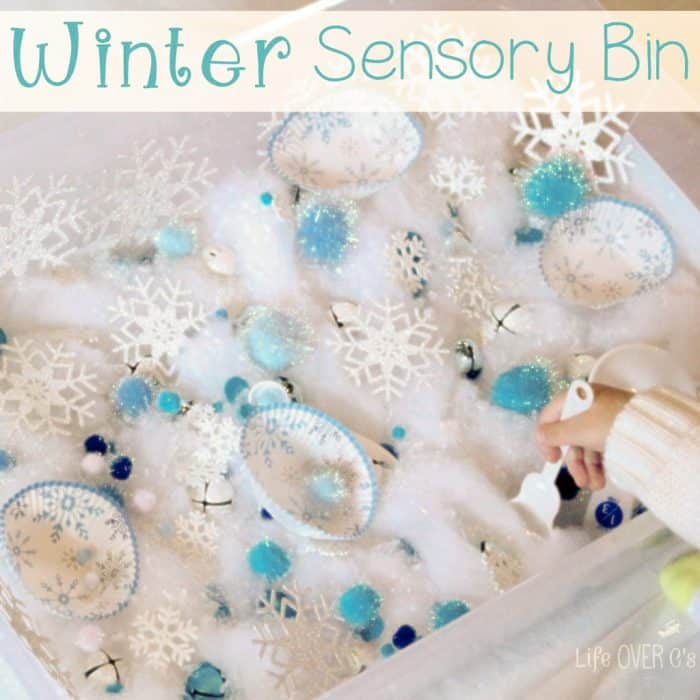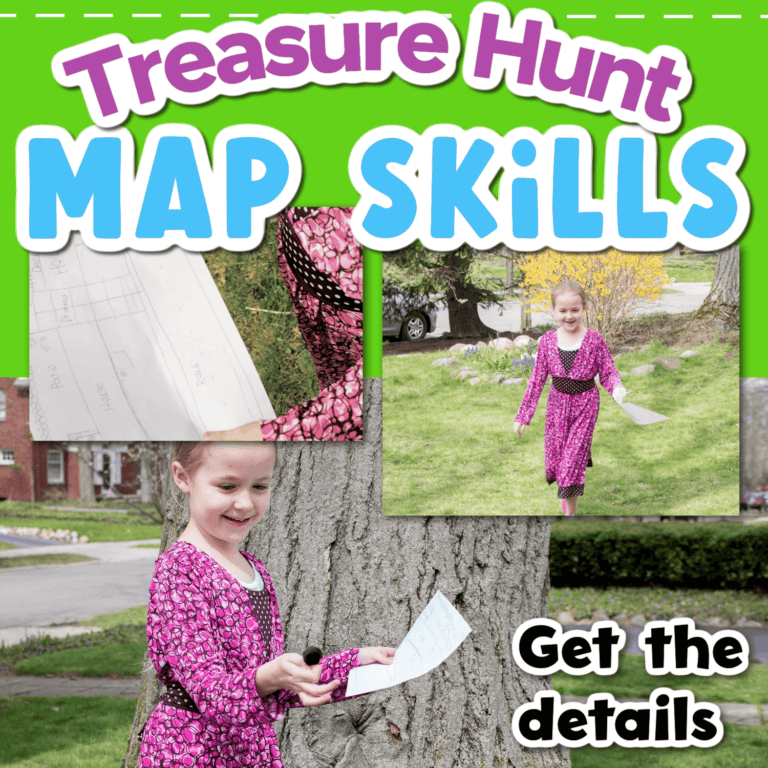Easy DIY Snowflake Winter Sensory Bin for Kids
Snowmen, penguins, hot chocolate, and snow; these are a few of my favorite winter things. Some of my least favorite parts of the winter season are wet mittens and tight, itchy sweaters. Can you say sensory overload!?
This fun winter snowflake sensory bin is a fantastic fun way to experience the colors and fluffiness of snow without the cold and the wetness that some kids (and adults) struggle. A winter activity wonderland at your fingertips (literally) can keep your mitten less hands warm and your itchy sweater in the closet.

Recommended Grade Level:
Living in Virginia we are lucky to get a few flurries every winter. In order for our kiddos to experience a winter wonderland, sometimes we need to pull out the pretend snow. This can also be a great idea for children that have sensory issues with real snow, but still like time for exploration.

Fun little tip: If you turn the cupcake liner inside out then you can see the design while they are sitting in the sensory bin. Otherwise, the cute decorations will be hidden underneath.
What is Sensory Play?
Sensory play is a wonderful way for babies, toddlers, preschool, and school aged children to learn through play. Sensory activities stimulate our senses and supports learning and development. Using fingers and hands to scoop can help build hand-eye coordination as well as fine motor skills. This type of play can be done in sensory tables, bins, sensory bag, and even bottles. KidSense Therapy Group shares a great article about what sensory play is.
Why is Sensory Play Important?
There are multiple developmental areas that sensory play supports:
- Cognitive development: problem solving, creativity, exploration.
- Language development: descriptive words, increasing vocabulary.
- Social development: peer interactions, sharing, social conversation.

What’s a Good Age to Start Sensory Play?
Sensory play is important for infants and toddlers, as well as preschoolers and older children. Activities and experiences are different for the various age groups to ensure the safety of the children. As always, close supervision is required.
Examples of sensory play for infants and toddlers:
- Tummy time with a black and white shapes or designs
- Water play during bath time
- Teething toys
- Playdough and kinetic sand (for older toddlers that wont put the material in their mouth).
Examples of sensory play for preschoolers and older children:
- Finger painting
- Colored rice bins
- Slime
- DIY fossils
- Shaving cream

How Do You Do Sensory Play at Home?
Sensory play at home can look like different things. During bath time, children can experiment with bubbles, toys, bath crayons, and pouring from cups. Another way to have sensory play at home is in the kitchen. Have your children taste different flavors and even make an edible playdough.
How Do You Do Sensory Play in the Classroom?
Sensory play in the preschool classroom can include larger containers like sand/water tables that multiple children can play with at a time. Just make sure that there’s nothing in the sensory bin or table that a student is allergic to. Outdoor sensory play can also be found on the playground. Sandboxes and even swings can help experience new senses with your students.
Plan Your Winter Math and Literacy Centers with One, Easy Download
Get 35+ Winter Themed Math & Literacy Activities in One Bundle
Included in the Winter Math and Literacy Pack:
- 2 Sets of Number Mats (empty ten-frame, filled ten-frame)
- Beginning Sound Match Up
- 4 Sets of Clip Cards (color, ten-frame, array, shape)
- Winter and Summer Clothing Sort
- Class Set of Ten-Frame BINGO
- 2 Graphing Dice Games
- 2 Spinner Graphing Games
- Line Tracing Cards
- Line-Up Puzzles for Counting to 5 & 10
- 4 Matching Games (picture, number, alphabet, rhyme)
- Missing Number Cards
- 3 Levels of AB Patterns
- Winter Play Dough Mats
- 2 Sets of Counting to 10 Puzzles (array, ten-frame)
- 2 Roll and Count Mats
- 2 Sets of Sorting Activities (shapes and big/small)
- 5 Spin & Cover Games (1-5, 6-10, shape, picture)
- Tic-Tac-Toe
- 4 Sets of Tracing Cards (uppercase, lowercase, number, shape)
- Visual Discernment Clip Cards
- Trace, Write & Draw the Room
- Ten-Frame Cards
How To Create This Winter Sensory Snow Bin For Kids
Materials for the winter sensory bin:
- Deep Bin
- Pillow fill (or cotton balls) for fake snow
- Decorative Snowflakes
- Bells
- Pom Poms
- Cupcake Liners
- Measuring Cups or Scoops
Step by Step Instructions on How to Set up the Easy Winter Sensory Bin:
- Prepare your floor with a towel, carpet, or other type of mat to contain any messes.
- Fill the bin or table with pillow filling (or cotton balls). I would add the material half way to the top so that the filling doesn’t spill out.
- Add in decorative glitter snowflakes, bells, pom poms, cupcake liners, and any other ‘winter themed’ materials you want to use.
- Place measuring cups or scoops into the bin or table.
How Can I Extend The Activity?
- Count the number of bells as they are placed in a cupcake liner.
- Build patterns across the snow with the pom poms, bells, buttons and snowflakes.
- Find matching pom poms from the variety of sizes and colors.
- Use the pom poms to create shapes in the snow.
- Sort the pom poms into cupcake liners by color or size.
- Add in winter or arctic animals to make a penguin sensory play bin or an arctic sensory bin.
- Use the Snowman Alphabet Matching Game to practice lowercase and uppercase letters.
Printable Winter Activities for Kids
Do you love this activity?
Pin it for later!

More Winter Sensory Activities You’ll Love:
Looking For More Winter Sensory Ideas?
Winter Art and Craft Activities for Kids
- Fine Motor Stitching Winter Snowflake Craft for Kids
- DIY Snowman Crafts
- Snowflake Melted Bead Ornament Craft for Kids
- A Sparkly, Black Glue Winter Snowflake Craft for Kids
- Winter Salt Painting
Search All Activities
Looking for more? Find exactly what you need here:















